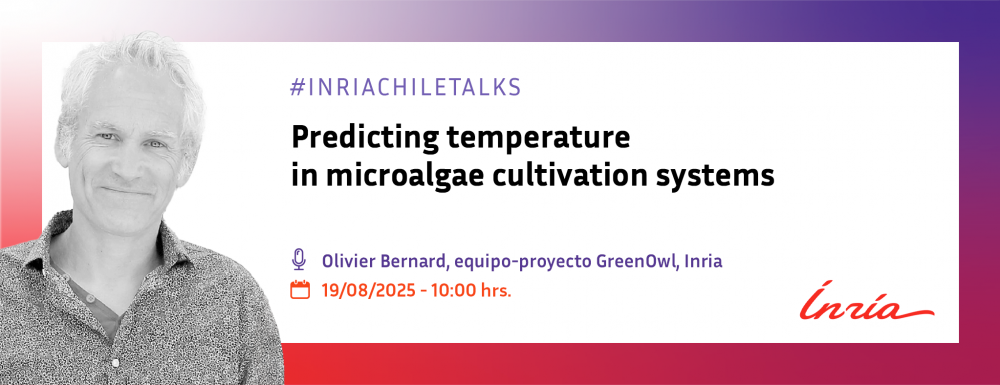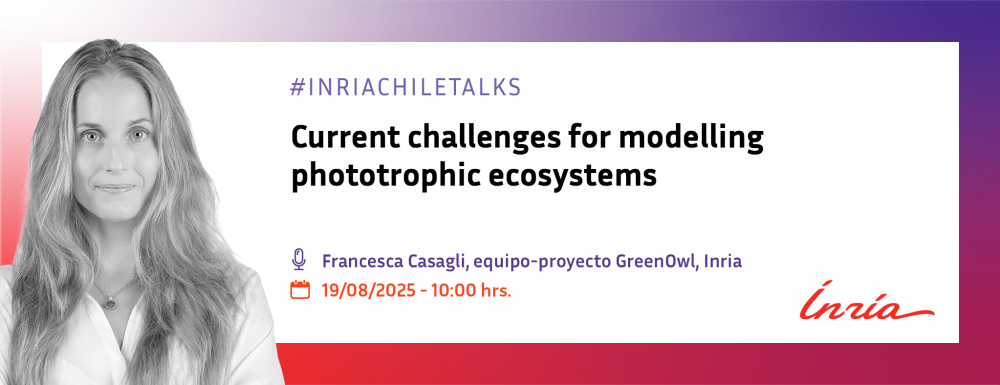- Tuesday, August 19, 2025 – 10:00 a.m. (Santiago, Chile time)
- Hybrid format
- The talk will be held in English
- Speakers:
- Olivier Bernard, Inria research director, GreenOwl project-team leader, Inria Centre at Université Côte d'Azur
- Francesca Casagli, researcher, GreenOwl project-team, Inria Centre at Université Côte d'Azur
Talk 1: Predicting temperature in microalgae cultivation systems
Microalgae cultivation for bioenergy production offers a sustainable pathway for converting solar energy into biofuels. However, solar-driven processes are inherently subject to fluctuations in light intensity and culture temperature, making accurate temperature prediction crucial for optimizing growth conditions. In this study, we present a reduced-model approach that transforms the complex heat transfer modeling challenge into a parameter identification problem. The proposed Auto-Tuning model, in a spirit of symbolic regression, balances accuracy and computational efficiency while maintaining a simple and interpretable structure. The SATHE model captures a wide range of heat transfer dynamics, with parameters that can be efficiently identified from experimental data. We first establish parameter identifiability and then develop an identification strategy based on gradient computation. The model’s performance is validated across two distinct reactor configurations and varying seasonal conditions.
Olivier Bernard
Olivier Bernard is research director at the French Institute for Research and Automatic Control (Inria) leading the GreenOwl research group. He is engineer from the Ecole Centrale de Lyon and got a master degree in Control Science in 1992. He obtained a Ph.D. degree in Biological Oceanography from the University Sorbonne University (Paris VI) in 1995. From 1996 to 1998 he was a Postdoctoral Fellow at the Centre for Systems Engineering and Applied Mechanics (CESAME), UCL.
Since 1999 he works as Senior Research Scientist at Inria, in the GreenOwl research team ( Generating renewable resources by optimisation of water living microorganisms ) which gathers biologists and mathematicians. O. Bernard coordinated several national and European projects on modelling and control of artificial ecosystems. He is author of more than 200 publications in scientific journals in the field of applied mathematics, automatic control, biotechnology, phycology, metabolism modelling and Life Cycle Analysis. O. Bernard is also the head of the French-Chilean Associated Team Art'In Blue.
Talk 2: Current challenges for modelling phototrophic ecosystems
Phototrophic microorganisms show great potential for wastewater treatment and resource recovery, but their effective deployment requires robust modeling frameworks challenged by several methodological hurdles. These biological processes are complex and dynamic, involving a wide range of time scales (e.g., photosynthesis, microbial growth, chemical dynamics), submitted to environmental variability (light, temperature, pollutants). Moreover, the data quality and quantity is generally insufficient for standard machine learning approaches. Balancing model complexity with data availability and practical applicability is the main challenge. Computational constraints and interdisciplinary barriers also hinder development. These challenges will be highlighted through real examples, and show how innovative approaches such as hybrid modeling, can bridge the gap between theoretical models and real-world implementation.
Francesca Casagli
Francesca Casagli holds a Master's degree in Environmental Engineering from the School of Engineering of Florence (Italy), where her thesis focused on the experimental and modelling study of a granular sludge reactor for wastewater treatment.
In November 2017, she began a Ph.D. in Environmental and Infrastructure Engineering at Politecnico di Milano (Italy), specializing in the mathematical modelling of algae/bacteria systems for wastewater remediation. During her Ph.D., she spent one year at INRAE (Narbonne, France), where she calibrated and validated the model using long-term datasets.
After defending her thesis in March 2021, she joined the Inria BIOCORE team as a postdoctoral researcher, working on the optimization of algae/bacteria systems. Since September 2022, she has been a permanent researcher in the same team, now named GreenOwl. Her current research focuses on the dynamical modelling of algae/bacteria systems for resource and energy recovery, as well as the mitigation of greenhouse gas emissions (particularly N₂O) in wastewater treatment. Her work integrates multiple modelling approaches, including Artificial Neural Networks.
In October 2022, she was awarded the L’Oréal-UNESCO For Women in Science prize.


